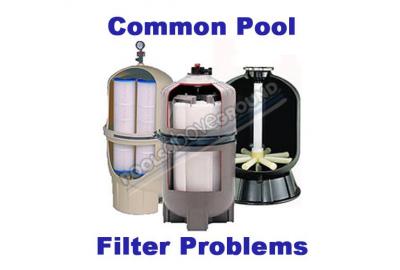February 23, 2021
267 view(s)
Although we deal more with above ground pools and filter systems, this article does apply to any pool filter system as they all are very much the same. Flollow along as I cover the most common and basic issues that pool owners face with their filtration systems.
At the end of the day, a pool filter is not a particularly complex device. Water passes through it, and anything that isn't water stays behind, right? However, a surprising number of things can go wrong with a pool filter. In fact, filter problems are a common phone calls we receive from frustrated and confused pool owners.
You see, your filter and its various components are ultimately essential to the safe and successful operation of your pool. So, in the interest of furthering your education about this magnificent (if finicky) little device, I've put together a list of common pool filter problems, and what you can do about them when they happen to you.
Filter Backflow Issues
Both sand and DE filters can end up shooting the contents that are supposed to be filtering the pool water out into the pool. In the case of the former, this usually happens due to a cracked lateral or a broken standpipe. Both of these components can be purchased and replaced quite easily. All you need are a few common tools.
When it comes to DE filters with backflow issues, worn grids that have started to tear are usually the culprit. However, it's also possible that you merely added too much DE powder when recharging, overloading the system, and forcing a discharge into the pool. Whenever possible, be sure to follow the owner's manual when refilling your filter. If you don't have one, estimate no more than 1 lb. of DE per square feet of your filter.
A Damaged Spider Gasket
If you take apart your multi-port valve (on sand and DE filters), you'll see a small gasket. It consists of a small center ring and several spokes connected to a larger outer ring, and looks sort of like a spider web or old-timey wheel. However, don't let the simplicity of this little component fool you – it can be a big pain for pool owners.
You see, a damaged or worn spider gasket can lead to leakage around the valve or even allow water to pour out of the waste line. Unfortunately, all it takes to damage the gasket is to move the valve handle while the pump is still running one time. Bust it, and you'll need to get your hands on a new one. However, that might not be so easy.
You see, depending on your gasket model, you might not be able to get a hold of one without having to buy an entire diverter assembly. If this happens, I suggest you weigh this purchase against the cost of a whole new valve instead.
Excessive Pressure
A range of filter problems are the direct result of pressure building up inside the tank. This can happen if you have a filter that's too small for the attached pump (which means it's pushing too much water at too fast a rate) or if the filter is so dirty that buildup is causing higher than average pressure. If you clean your filter and still experience high-pressure issues, you should immediately start inspecting the plumbing lines for clogs.
Not Enough Pressure
While too much pressure can obviously lead to problems, so can pressure that is too low. For instance, a low reading might indicate that there is something keeping water from properly entering the filter. This will inhibit your pool's circulation and potentially allow algae and bacteria to build up. I suggest you immediately check the basket on your pump and impeller. If you find leaves or other debris, clearing them out of the way will typically improve water flow.
Another cause of low pressure is a weir that's been jammed into the open position. Weirs are the names for the flaps on the skimmer that move back and forth. When fully opened, they will negatively affect the pressure and function of your system. Of course, repeated low readings without explanation might also indicate that the gauge itself is broken and simply needs to be replaced.
Bad Grids or Cartridges
In some cases, your filter might be acting up because it needs a new cartridge or grid. This is where it's very important to know what model you're using. I always suggest holding on to all of your user manuals, etc., to make buying replacement parts much easier. But, if you don't have access to these materials, you can measure the length and width of both the full and partial grids (for DE filters) and the diameter and length of the cartridge itself to find the right ones. If you try to guess, you'll only end up running back and forth to the pool store over and over again.
Conclusion
As I said, pool filters are not particularly complex devices. Still, when things start to go wrong, diagnosing the problem can be as frustrating as any other aspect of pool ownership. In the end, your filter is essential to maintaining a healthy pool. So if you don't want small problems to turn into big ones quickly, don't ignore any signs that your filter needs some TLC.
For more detailed questions or general interest in
above ground pools please give us a call at (866) 534-9725. Or visit our webstore at
https://www.poolsaboveground.com/


